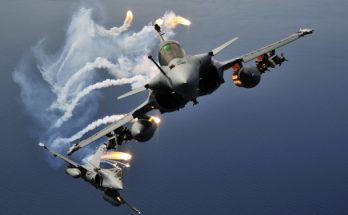
Lawmakers finally passed much-delayed foreign assistance legislation over the weekend, including $61 billion in funding for Ukraine-related support, as well as $26 billion for Israel and $8 billion for Taiwan. The Senate will now take up the House language as early as Tuesday, and could approve the measure this week. A U.S. official told Reuters that much-needed ammunition and missiles can begin being delivered to Ukraine “within days” of the aid bill being passed into law.
Ukrainian President Volodymyr Zelensky hailed the House bill’s passage, stating that, if Kyiv receives the weapon systems it needs, “we will have a chance for victory.” He and Foreign Minister Dmytro Kuleba have been sounding the alarm for months that Ukraine is critically-lacking in air-defense systems and ammunition, having exhausted stores of anti-air missiles to intercept the daily bombardments from Russia.
The Ukrainian government has also pushed for Washington to send tactical missiles, such as ATACMS, that enable precision strikes against key Russian sites behind the frontlines. Ukraine received a small quantity last year and Washington has recently warmed to the idea of sending more, despite the Biden administration’s apparent annoyance at Ukrainian strikes on Russian gas infrastructure.
Moving the bill forward may yet cost House Speaker Mike Johnson his position, a role he has been in since his colleagues ousted predecessor Kevin McCarty in October. While the Ukraine bill comfortably passed the House with Democratic support, 112 Republicans voted against it (with another voting “present”), compared to only 101 in favor, underscoring the extent to which the Republican party has soured on backing Kyiv.
U.S. aid to Ukraine dried up at the end of 2023, falling victim to growing opposition in the House Republican caucus. Particularly with 2024 being a general election year, Ukraine skeptics in the Republican party pushed for the House to at least drive a harder bargain on issues like border security. Some would prefer the U.S. curtail aid entirely. After the Democratic-controlled Senate passed its own Ukraine aid bill in February, Speaker Johnson said, “the Republican-led House will not be jammed or forced into passing a foreign aid bill.”
Speaker Johnson sounded a different tune last week as he prepared to move the bill. While he acknowledged that he might lose the speakership, he said, “I can make a selfish decision and do something that is different, but I’m doing here what I believe to be the right thing. I think providing aid to Ukraine right now is critically important.”
Interestingly, Speaker Johnson’s turnaround on Ukraine aid came with a tone change from Donald Trump, who is neck-and-neck with President Joe Biden in the polls in his bid to return to the White House in 2025. Two days before the House vote, Trump wrote in a post on his social media website, “As everyone agrees, Ukrainian Survival and Strength should be much more important to Europe than to us, but it is also important to us!”
Resumption of American aid comes not a moment too soon for Ukraine, as Russia is gearing up for a new summer campaign in the coming months, with eastern city Kharkiv said to be a major target. Around this time last year, Ukraine was readying its own offensive, hoping to puncture through Russian lines to not only take lost ground but convince its Western partners that the war could be won on the battlefield. Months of effort produced very little results, significantly depleting Ukraine’s military while providing an opportunity for Russia to go on offensive this year.
Recent Russian military successes – the capture of Bakhmut in 2023 and the fall of Avdiivka earlier this year – demonstrate that advancing requires stomaching incredible losses of personnel and armor, but Russia’s manpower advantages have given Moscow confidence that it can outlast Kyiv in a war of attrition. While Ukraine runs short on personnel, Russian officials have claimed there is a steady stream of new recruits into Russian service, particularly after IS-KP’s terror attack on the Crocus City Hall last month.
The Kremlin also reckons it can stare-down the West, calculating that Western capitals will only grow more weary of sending money and guns to Kyiv as the war grinds on. Washington’s gridlock has been incredibly significant for Ukraine’s fortunes on the battlefield, given that, since the start of the war, the U.S. has provided more military aid to Ukraine than the next five largest contributors combined. Lagging military aid has enabled Russia to chip away at Ukrainian positions and, considering how herculean a task it was to move this aid package through the Congress, the Kremlin likely figures that it will be one of the last.
Ukraine will nevertheless be in a better position to defend itself against the upcoming Russian offensive now that new American aid is on the way, raising the possibility that the war will come to an effective stalemate, where neither combatant is able to meaningfully advance without sustaining debilitating losses. That should strengthen Kyiv’s negotiating hand, particularly amid signs in the West that some of Ukraine’s partners might push it towards “some kind of compromise” with Moscow.
Military markets analyst, covering Eurasia, Middle East, and Africa.




